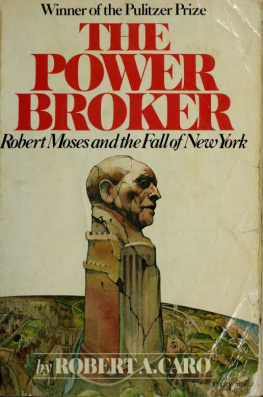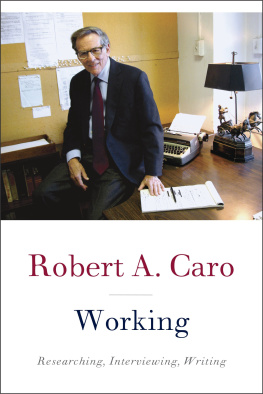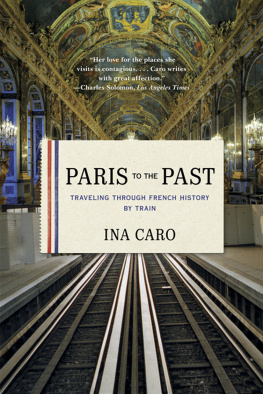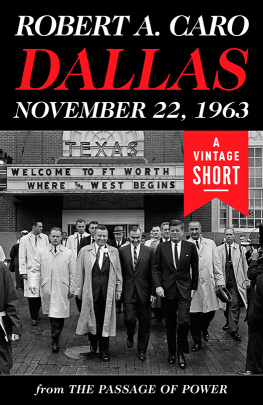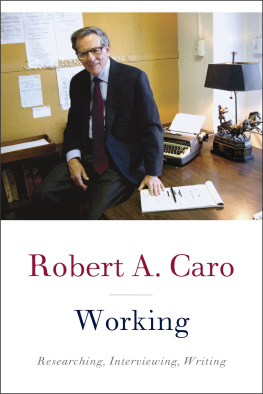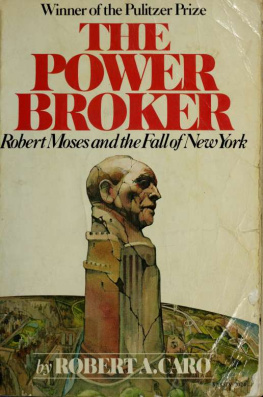Caro - The power broker: Robert Moses and the fall of New York
Here you can read online Caro - The power broker: Robert Moses and the fall of New York full text of the book (entire story) in english for free. Download pdf and epub, get meaning, cover and reviews about this ebook. year: 1975, publisher: Vintage Books, genre: Politics. Description of the work, (preface) as well as reviews are available. Best literature library LitArk.com created for fans of good reading and offers a wide selection of genres:
Romance novel
Science fiction
Adventure
Detective
Science
History
Home and family
Prose
Art
Politics
Computer
Non-fiction
Religion
Business
Children
Humor
Choose a favorite category and find really read worthwhile books. Enjoy immersion in the world of imagination, feel the emotions of the characters or learn something new for yourself, make an fascinating discovery.
The power broker: Robert Moses and the fall of New York: summary, description and annotation
We offer to read an annotation, description, summary or preface (depends on what the author of the book "The power broker: Robert Moses and the fall of New York" wrote himself). If you haven't found the necessary information about the book — write in the comments, we will try to find it.
The power broker: Robert Moses and the fall of New York — read online for free the complete book (whole text) full work
Below is the text of the book, divided by pages. System saving the place of the last page read, allows you to conveniently read the book "The power broker: Robert Moses and the fall of New York" online for free, without having to search again every time where you left off. Put a bookmark, and you can go to the page where you finished reading at any time.
Font size:
Interval:
Bookmark:


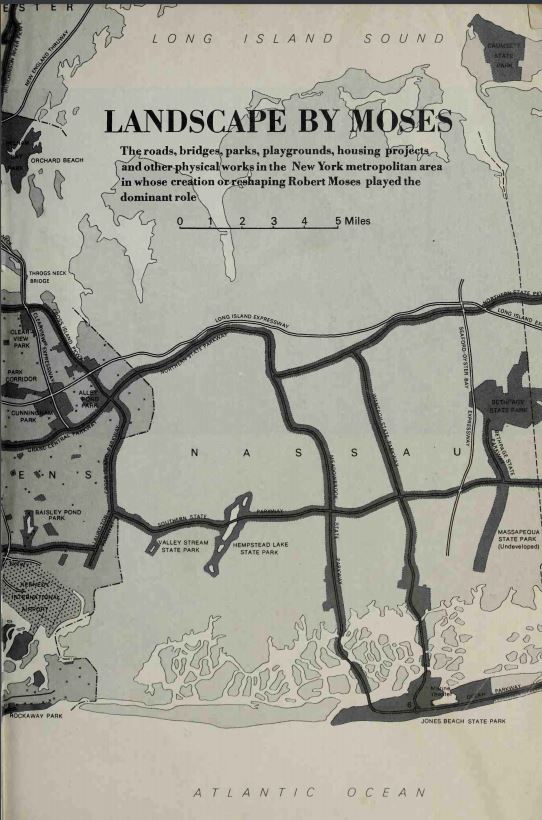
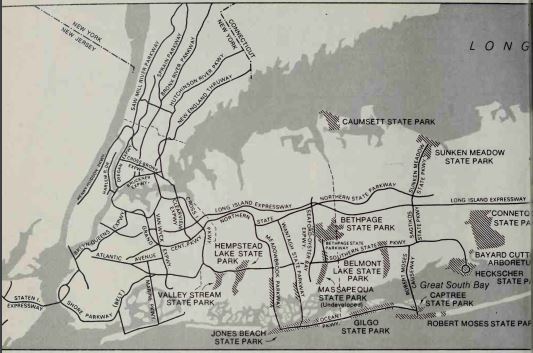


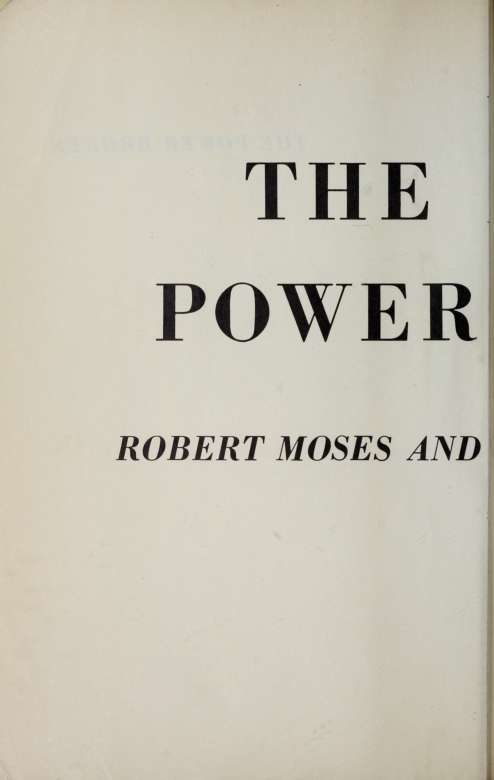
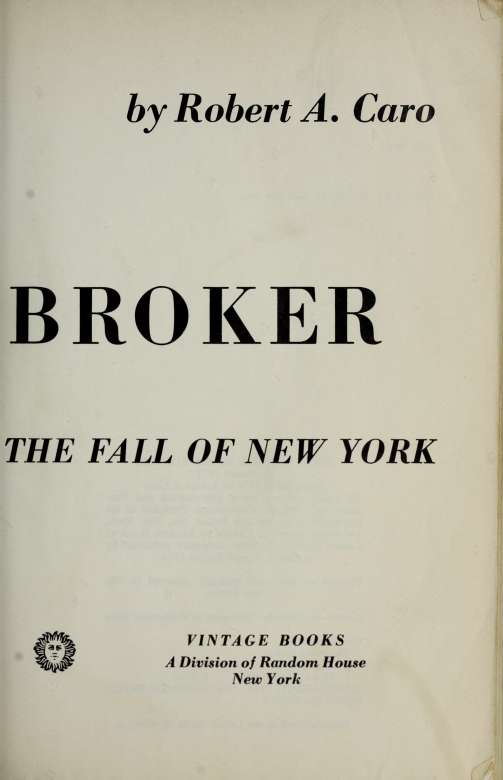
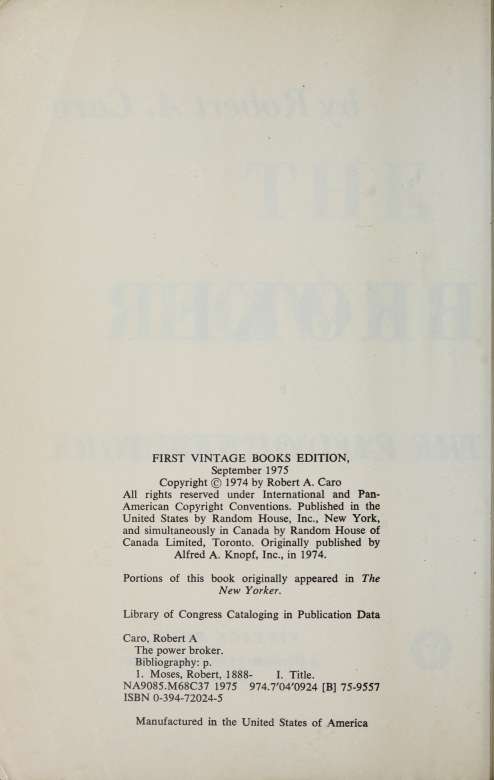
FOR INA
and for DR. JANET G. TRAVELL
As A S ENIOR at Yale, Moses had decided to go on to Oxford. He had
wanted to go as a Rhodes Scholar, but every third year the prestigious scholarships were not awarded, and 1909 was a third year (the system was changed in 1916). Unwilling to wait until 1910and with no financial need tohe paid his own way.
Asked in later years why he had chosen Oxford for his postgraduate work, Moses would shrug and say there had been no special reason. But his choice turned out to be an apt one. He was to find in Oxford a spiritual home.
The marriage of Bernhard Cohen and Rosalie Silverman had been a marriage of brilliant mind with brilliant mindand of idealism, crystallized in a desire to improve the lives of the lower classes, with an overweening arrogance. The strain of brilliance, idealism and arrogance had surfaced in a daughter, Lady Bountiful, and had been passed on through herundiluted, strong but somewhat formlessto her son Robert. Oxford, using the brilliance as catalyst, was to refine the other two ingredients in the strain. Two years among her spires and statue-crowned columns, her quadrangles and cloisters, her towers that had whispered to Matthew Arnold "the last enchantments of the Middle Ages," would boil the fattiness out of the idealism, rendering out of a vague desire to "help people" not only a clear, definable concept of public service but also a specific means of performing that service. Two years among her richly paneled halls, her ancestral tankards and inlaid croziers, among begowned processions led by bedels carrying silver staves and among gardens tended by a thousand gardeners would distill the arrogance, potent though it already was, and make it still more potent by adding to its essence a philosophical base, the British belief, firm indeed in the early twentieth century and epitomized in the trappings and teachings of Oxford, in the dutiesand the rightsof those born to wealth and privilege.
Oxford in 1909 was the castle keep of British conservatism. The key to its ancient gates was wealth; in the year Robert Moses entered Oxford's Wadham College, the university was largely closed to the student whose family was not rich. Conservatism characterized the attitude of its students including the ninety Americans among them. When, three months after Moses' arrival, an American Club was organized, its first meeting featured two speakers who said, respectively, "We are as much interested as anyone in preserving Oxford as a home of English conservatism and tradition" and "We should carry into the bustle and stir of the New World, the atmosphere of the Old."
As strong as Oxford's conservatism was its emphasis on public service. Its tone in 1909 had been set for the preceding three centuries by rich young men who were sent to the university as a preliminary to public life and who, from positions in Parliament or the civil service or the learned professions, actually did, after graduation, govern Britain and its vast territories overseas. But the leavening of devotion to public service with an unabashed insistence on the rights and privileges of aristocracy could not help but make that devotion somewhat patronizing, infusing it with a strong air of condescension and noblesse oblige in its most obnoxious form. It was a refined, more subtle but also more deeply rooted version of the attitude of the German Jews of New York toward the Russian and Polish latecomers, of Bella toward the children whose parents didn't even know how to bring them up so they would be able properly to clean the cabins Madison House had been kind enough to build for them.
Bella's son was very happy at Oxford. His most frequent companion was Mai Dougherty, his friend from Yale, who was also studying at Wad-ham. "Bob had a very good time at Oxford," Dougherty recalls. "He liked it very much. It was such a relief after Yale. Yale had that pseudo-democracy, but it was not democratic at all; it was snooty, with all that social tradition. When we got to Oxford, we found all this changed. It was understood by everyone there that by the very fact that you belonged to Oxford, you were the select and the elect. You didn't have to compete for prestige or honors to become one of the elite. Because you were there, you were the elite." Moses' understanding of this factand his acceptance of it shone through an article he sent to the Yale Alumni Weekly. "There is a moribund institution for workingmen's sons somewhere in Oxford," he sneered. "I have never yet met an undergraduate who knew its exact location, nor have I met anyone who did not become incoherent with rage when it was defended."
Moses liked the gentleman's life that Oxford offered. Breakfast, lunch and tea were served in the students' rooms, and they were encouraged to entertain friendsof whom Moses had plenty. Says one classmate, "Bob was almost universally loved." The first American in history to be elected captain of the Dark Blue water-polo team, he was also swimming captain, although, as at Yale, if he ever won a race, the victory went unrecorded. Taking up debating, he became the first American ever to be elected president of the august Oxford Union, that hardiest of debating clubs.
Oxford's exemption of students from all marks and tests except for a single, all-inclusive examination given after two years appealed to the student who even at Yale had refused to be bound by the confines of his courses. "The Oxford education... confers on the average undergraduate independence of mind," he wrote in the Alumni Weekly.
Vacations were an especially happy time. Moses and Dougherty spent their "vacs" on walking tours of England or traveling abroad, often with Moses' roommate, John Gilbert Higgins, a Rhodes Scholar from Newfoundland who sported a long knitted scarf and a thick Irish brogue.
In Switzerland, the youths tried out a sport that was just beginning to attract the attention of American tourists: skiing. In Italy, Moses saw again the frescoes and statues he had loved as an undergraduate and spent hours being gondolaed around Venice, a city with which he had fallen in love. Every summer, his family would sail to Europe and take a large suite of rooms in a hotel overlooking the Lake of Lucerne. There, Moses and Dougherty played tennis, swam and climbed mountains.
Font size:
Interval:
Bookmark:
Similar books «The power broker: Robert Moses and the fall of New York»
Look at similar books to The power broker: Robert Moses and the fall of New York. We have selected literature similar in name and meaning in the hope of providing readers with more options to find new, interesting, not yet read works.
Discussion, reviews of the book The power broker: Robert Moses and the fall of New York and just readers' own opinions. Leave your comments, write what you think about the work, its meaning or the main characters. Specify what exactly you liked and what you didn't like, and why you think so.

